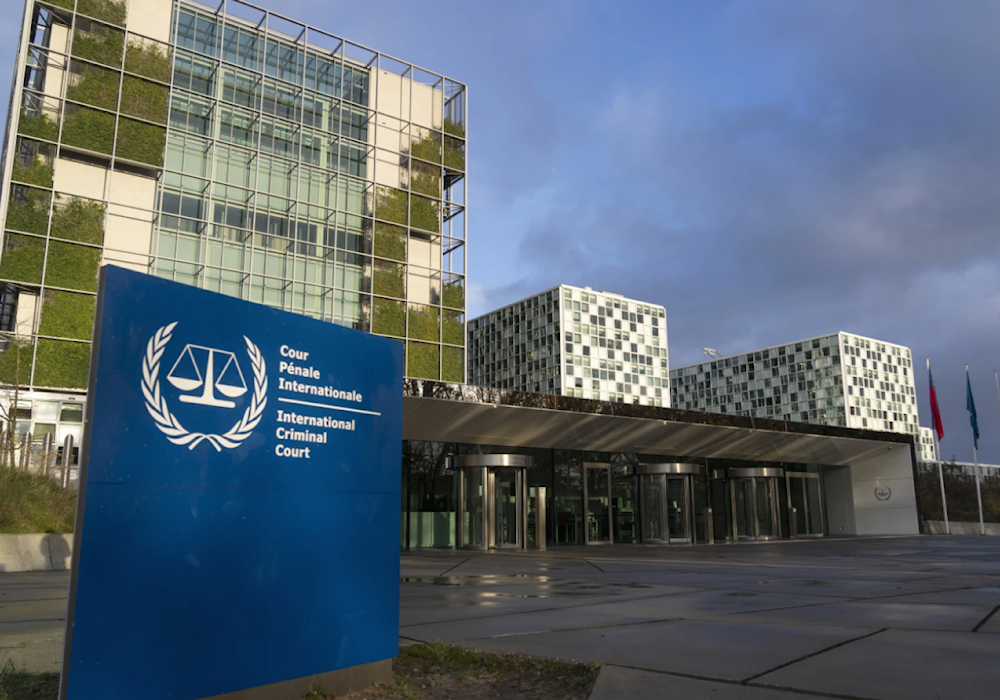EU backs International Criminal Court after US sanctions judges
Trump's sanctions target four ICC judges in response to the court’s arrest warrant against Netanyahu.
-

Exterior view of the International Criminal Court in The Hague, Netherlands, on December 6, 2022 (AP)
The EU expressed strong support on Friday for the International Criminal Court (ICC) in the aftermath of the US sanctions imposed on four of the court's judges. Slovenia, an EU member state, announced plans to urge Brussels to block the enforcement of the US sanctions within Europe.
European Commission President Ursula von der Leyen emphasized, "The ICC holds perpetrators of the world’s gravest crimes to account and gives victims a voice. It must be free to act without pressure."
Meanwhile, Antonio Costa, President of the European Council representing the 27 member states, described the ICC as "a cornerstone of international justice," stressing the importance of protecting its independence and integrity.
The sanctions, issued by the Trump administration, targeted four ICC judges in response to the court’s arrest warrant against Israeli Prime Minister Benjamin Netanyahu and a prior investigation into accusations of war crimes committed by US troops in Afghanistan. The judges sanctioned are Solomy Balungi Bossa of Uganda, Luz del Carmen Ibanez Carranza of Peru, Reine Adelaide Sophie Alapini Gansou of Benin, and Beti Hohler of Slovenia.
US sanctions, Europe responds
The US sanctions place the judges on a special list of designated individuals, freezing any US-based assets they hold and subjecting them to an automated screening system used not only by American banks but by many financial institutions worldwide. This makes it extremely difficult for those sanctioned to open or maintain bank accounts or transfer money internationally.
Trump’s original order also warned that US citizens providing services to these sanctioned individuals could face civil and criminal penalties.
Reactions to ICC sanctions
Slovenia
Slovenia called on the EU to activate its blocking statute, a legal tool that prohibits European companies from complying with foreign sanctions deemed unlawful by Brussels. This measure has previously been used to counteract U.S. sanctions on trade with Cuba and Iran.
"Due to the inclusion of a citizen of an EU member state on the sanctions list, Slovenia will propose the immediate activation of the blocking act," Slovenia's foreign ministry said in an X post.
Germany
German Foreign Minister Johann Wadephul expressed on Friday Germany's regret for the US decision, saying, "We note with regret yesterday’s announcement by the US to impose additional sanctions on the court. Germany will continue to be a steadfast supporter of international law and the ICC.
Norway
Norwegian Foreign Minister Espen Barth Eide also expressed regret over the US decision.
"The ICC plays a vital role in the fight against impunity. Norway remains committed to support and defend the ICC in carrying out its mandate impartially and independently," Eide said on X.
UN
UN human rights chief Volker Turk said on Friday that he is “profoundly disturbed” by the US government's sanctions against four International Criminal Court (ICC) judges.
"Attacks against judges for performance of their judicial functions, at national or international levels, run directly counter to respect for the rule of law and the equal protection of the law – values for which the US has long stood,” he said in a statement.
He called for the “prompt reconsideration and withdrawal” of the sanctions against the judges, who participated in rulings related to Afghanistan and Palestine.
"Such attacks are deeply corrosive of good governance and the due administration of justice," he added.
ICC too
ICC President Judge Tomoko Akane had already petitioned the EU in March of this year to include the ICC in the scope of the blocking act.
The fresh measures come at a difficult moment for the International Criminal Court (ICC), which is also dealing with prior US sanctions against its top prosecutor, Karim Khan, who stood down temporarily last month during a United Nations probe into suspected sexual misconduct.
On Friday, the court's governing council, which represents its 125 member nations, denounced the United Nations government's move to retaliate against judges.
"These ... are regrettable attempts to impede the Court and its personnel in the exercise of their independent judicial functions", the Assembly of States Parties Presidency stated.

 4 Min Read
4 Min Read








